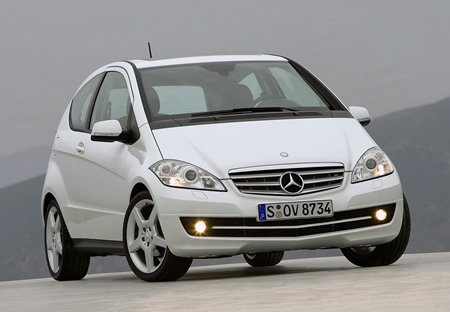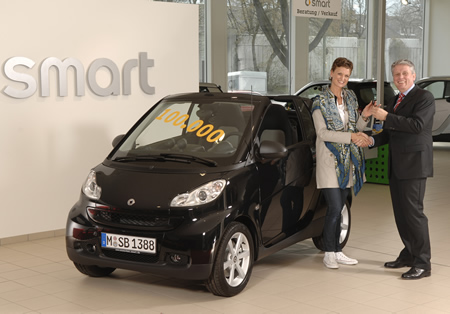« Gerald Genta Creates a One-of-a-Kind Model in Support of the Theodora Foundation | Main | Lord and Taylor Re-Launches Its Legendary Rose »
April 9, 2008
Daimler is well prepared for the current economic challenges, says Daimler CEO


Photo: The new generation A-Class: Mercedes-Benz A 170 Coupé
BERLIN, April 9, 2008 -- Daimler AG is expecting approximately 6,600 shareholders to attend today's first Annual Meeting under the new name of Daimler in Berlin.
Six months after the start of Daimler, Chairman of the Board of Management (CEO) and Head of Mercedes-Benz Cars Dr. Dieter Zetsche sums up: "All of our business operations are developing well -- our key figures are significantly better than they have been in recent years." Addressing the shareholders, Zetsche says, "Your Company has made substantial progress over the past two years. Old virtues have given us new strength." Looking into the future, the Chairman of the Board of Management says, "We have a clear strategy for sustainable profitable growth."
Sustainable mobility and accident-free driving are the most important focuses of Daimler's research and development work. "We invented the automobile -- and we are passionately shaping its future," Zetsche says. The world is embarking on a second "automotive century," in which the number of automobiles in the world is growing five times as fast as its population. In the long term, this increase will only be ecologically acceptable if passenger cars and commercial vehicles become cleaner. Zetsche: "Customers expect us to provide solutions -- and we are willing to accept a pioneering role when it comes to clean and safe automobiles." Daimler has the required innovative power and the financial means to meet this challenge.
Daimler's "road map for sustainable mobility" consists of three pillars: the ongoing optimization of vehicles with innovative combustion engines; the additional improvement of efficiency through hybridization -- i.e. the combination of a combustion engine with an electric motor; and zero-emission driving with fuel cells and battery-driven systems.

Photo: Susanne Baldszun with her new smart fortwo cabrio (pulse 62 kW) and Ulrich Kowalewski, Director of the Mercedes-Benz Center Munich. Yesterday afternoon, Kowalewski handed over the 100,000th second-generation smart fortwo to this 36-year-old customer in the recently re-opened smart Center Munich. "The new fortwo is even more comfortable, more agile, safer, and more environmentally friendly than its successful predecessor," says Anders Sundt Jensen, who is responsible for brand management at smart. "The new fortwo is now offered in 37 countries, where enthusiastic customers are won over by the vehicle's lifestyle-oriented design, as well as its exceptional fuel economy and environmental compatibility." The unique two-seater is most popular with customers in Italy and Germany, who account for two-thirds of all drivers of the new fortwo. Demand is particularly high for the premium equipment line "passion", which is chosen by two out of three buyers worldwide.
Zetsche emphasizes that Daimler will not start building only small cars: "Our route to sustainable mobility is based on technological innovations, not renunciation." The company has the concrete goal of offering at least one model in each of the Mercedes-Benz core model series that is a leader in terms of consumption and emissions. In addition zero-emission driving, Daimler is also pursuing the goal of accident-free driving.
According to the text of his speech, Zetsche essentially confirms the outlook for 2008 and the coming years that was presented at the Annual Press Conference: "Currently, the economic climate suggests that things will get tougher rather than easier." Key factors are the credit crisis in the United States, the ongoing weakening of the Dollar against the Euro, the development of the raw material markets, and the low level of confidence in the U.S. economy with possible effects around the world.
In Daimler's view, the automotive markets will not remain unaffected by these developments. For example, the demand for passenger vehicles in the United States is likely to be much lower this year than in 2007; in Western Europe, it is expected to remain flat. Growth in the industry will therefore continue to be driven by the emerging markets, whose growth is so dynamic that it will more than offset the triad's weakness. Overall, Daimler assumes that the global market for passenger cars will grow by approximately 2% in 2008.
With regard to commercial vehicle markets, Europe is expected to maintain last year's high sales level. In North America, Daimler does not anticipate a recovery before the second half of the year.
Source: Daimler AG
|GlobalGiants.com|







Edited & Posted by the Editor | 5:05 AM | Link to this Post







